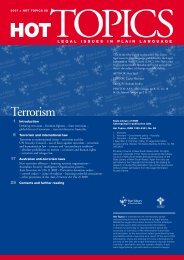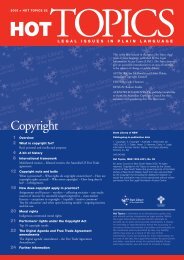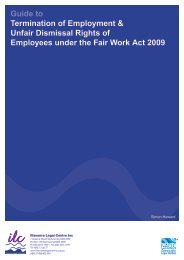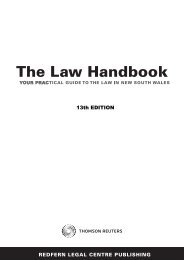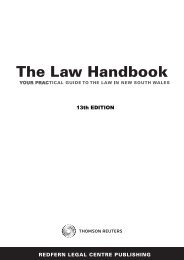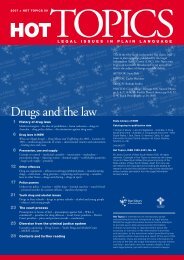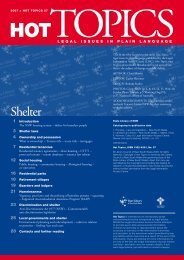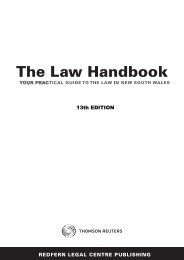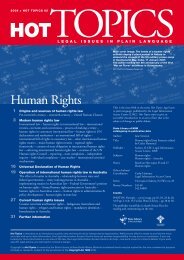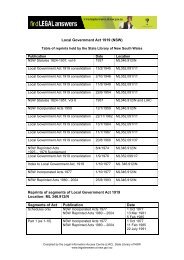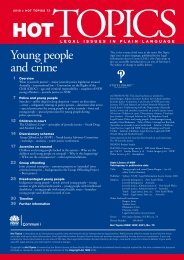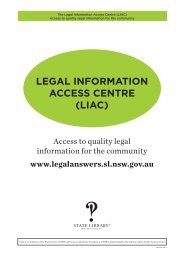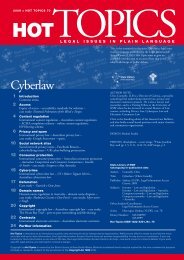Hot Topics 64 - Health and the Law - Legal Information Access Centre
Hot Topics 64 - Health and the Law - Legal Information Access Centre
Hot Topics 64 - Health and the Law - Legal Information Access Centre
You also want an ePaper? Increase the reach of your titles
YUMPU automatically turns print PDFs into web optimized ePapers that Google loves.
treatment, <strong>and</strong> also that health service providers have a<br />
responsibility to protect <strong>the</strong> confidentiality <strong>and</strong> privacy<br />
of health service users. For fur<strong>the</strong>r information see<br />
www.nt.gov.au/omb_hcscc/hcscc/index.htm<br />
elecTrOnic HealTH recOrds<br />
Traditionally, health information has been collected <strong>and</strong><br />
stored in paper-based systems, with information about<br />
one individual held in a number of disparate locations,<br />
such as general practitioners’ records, hospital records,<br />
pathology laboratory records <strong>and</strong> medical specialists’<br />
records. However, health information is increasingly<br />
collected, stored <strong>and</strong> transferred in electronic form<br />
<strong>and</strong> health information about large numbers of health<br />
consumers is collected into central databases, such as <strong>the</strong><br />
Medicare database <strong>and</strong> cancer registers.<br />
Ano<strong>the</strong>r important trend is <strong>the</strong> move to integrate health<br />
information systems <strong>and</strong> to create shared electronic<br />
health records. Sharing <strong>and</strong> linking of health information<br />
about particular individuals has <strong>the</strong> potential to achieve<br />
better health outcomes for consumers – by allowing<br />
health service providers, regardless of <strong>the</strong>ir location,<br />
better access to health information – but have also given<br />
rise to privacy concerns.<br />
A large number of electronic health information<br />
systems are being developed at <strong>the</strong> local, regional<br />
<strong>and</strong> national levels across Australia. Some important<br />
national initiatives are being developed by <strong>the</strong> National<br />
E-<strong>Health</strong> Transition Authority (NEHTA). NEHTA is<br />
developing a national approach to Shared Electronic<br />
<strong>Health</strong> Records (SEHRs) – records that will contain<br />
selected health information about a health consumer,<br />
which can be shared among multiple authorised health<br />
service providers. An important precursor to SEHRs<br />
is <strong>the</strong> development of Unique <strong>Health</strong>care Identifiers<br />
(UHIs) for individuals <strong>and</strong> healthcare providers to<br />
ensure that information is attributed to <strong>the</strong> right patient<br />
<strong>and</strong> <strong>the</strong> right provider. For fur<strong>the</strong>r information see<br />
www.nehta.gov.au<br />
cHildren <strong>and</strong> YOung peOple<br />
The Privacy Act does not set a minimum age at which<br />
an individual can make decisions regarding his or her<br />
own personal information. Guidelines developed by<br />
<strong>the</strong> Office of <strong>the</strong> Privacy Commissioner provide some<br />
assistance in dealing with children <strong>and</strong> young people.<br />
The Guidelines to <strong>the</strong> National Privacy Principles suggest<br />
that each case must be considered individually, <strong>and</strong> give<br />
guidance on when a young person may have <strong>the</strong> capacity<br />
to make a decision on his or her own behalf:<br />
As a general principle, a young person is able to give<br />
consent when he or she has sufficient underst<strong>and</strong>ing<br />
<strong>and</strong> maturity to underst<strong>and</strong> what is being proposed.<br />
In some circumstances, it may be appropriate for a<br />
parent or guardian to consent on behalf of a young<br />
person; for example if <strong>the</strong> child is very young or lacks<br />
<strong>the</strong> maturity or underst<strong>and</strong>ing to do so <strong>the</strong>mselves.<br />
The Guidelines on Privacy in <strong>the</strong> Public <strong>Health</strong> Sector<br />
stress that where a young person is capable of making<br />
his or her own decisions regarding personal information,<br />
he or she should be allowed to do so. The guidelines<br />
fur<strong>the</strong>r suggest that, even if <strong>the</strong> young person is not<br />
competent to make a decision, his or her views should<br />
still be considered.<br />
Generally, state <strong>and</strong> territory privacy legislation <strong>and</strong><br />
administrative schemes adopt <strong>the</strong> same approach to<br />
children <strong>and</strong> young people as <strong>the</strong> Privacy Act. Some state<br />
<strong>and</strong> territory legislation provides guidance regarding <strong>the</strong><br />
capacity of children or young people to make decisions<br />
regarding <strong>the</strong>ir own personal information. For example<br />
<strong>the</strong> <strong>Health</strong> Records <strong>and</strong> <strong>Information</strong> Privacy Act 2002<br />
(NSW) <strong>and</strong> <strong>the</strong> <strong>Health</strong> Records Act 2001 (Vic) both<br />
provide that an individual is incapable of making<br />
such decisions if he or she cannot underst<strong>and</strong> <strong>the</strong><br />
general nature <strong>and</strong> effect of such a decision, or cannot<br />
communicate his or her decisions.<br />
The <strong>Health</strong> Records (Privacy <strong>and</strong> <strong>Access</strong>) Act 1997 (ACT)<br />
links <strong>the</strong> test of capacity to <strong>the</strong> individual’s ability to<br />
underst<strong>and</strong> <strong>the</strong> nature of, <strong>and</strong> give consent to, a health<br />
service. Some legislation also includes express provisions<br />
on how, <strong>and</strong> by whom, decisions can be made on behalf<br />
of a child or young person unable to make his or her<br />
own decisions.<br />
deceased indiViduals<br />
DWSPL/A Hampton.<br />
image u navailable<br />
The federal Privacy Act does not protect <strong>the</strong> personal<br />
information of deceased individuals, except for<br />
special provisions dealing with declared disasters<br />
<strong>and</strong> emergencies. However, <strong>the</strong> Privacy <strong>and</strong> Personal<br />
<strong>Information</strong> Protection Act 1998 (NSW), <strong>the</strong> <strong>Health</strong><br />
Records <strong>and</strong> <strong>Information</strong> Privacy Act 2002 (NSW)<br />
<strong>and</strong> <strong>the</strong> <strong>Health</strong> Records Act 2001 (Vic) cover personal<br />
information about individuals who have been dead for<br />
less than 30 years. This reflects <strong>the</strong> 30 year period after<br />
<strong>Health</strong> privacy in Australia 9



